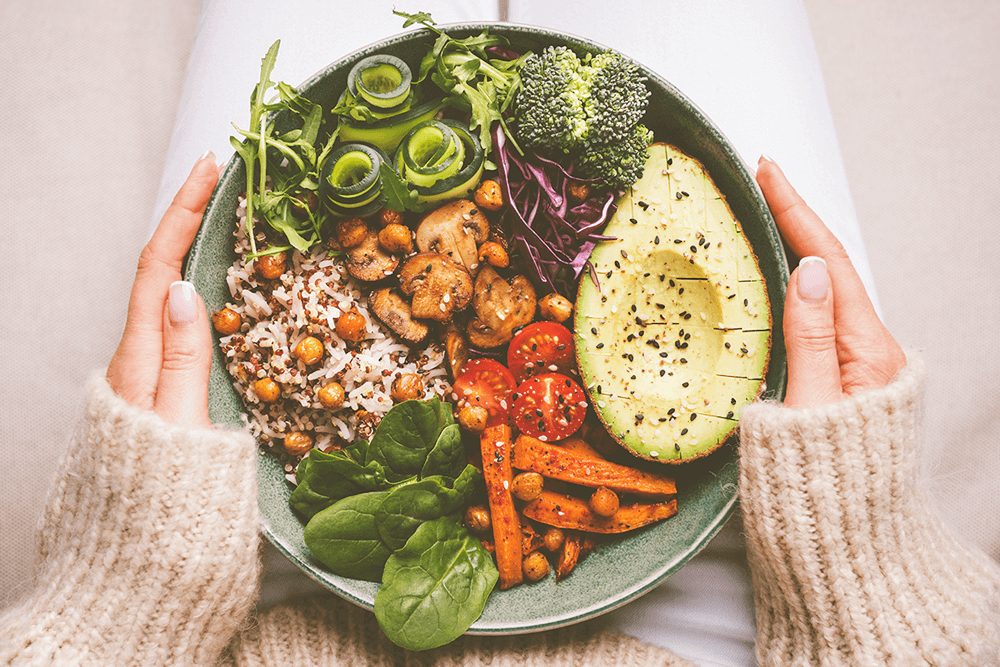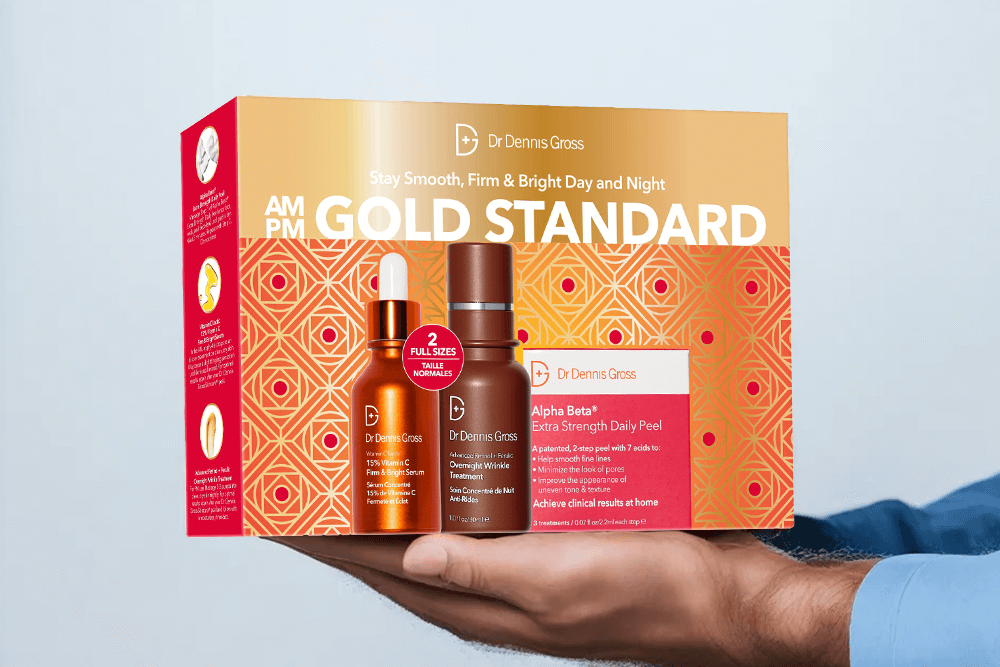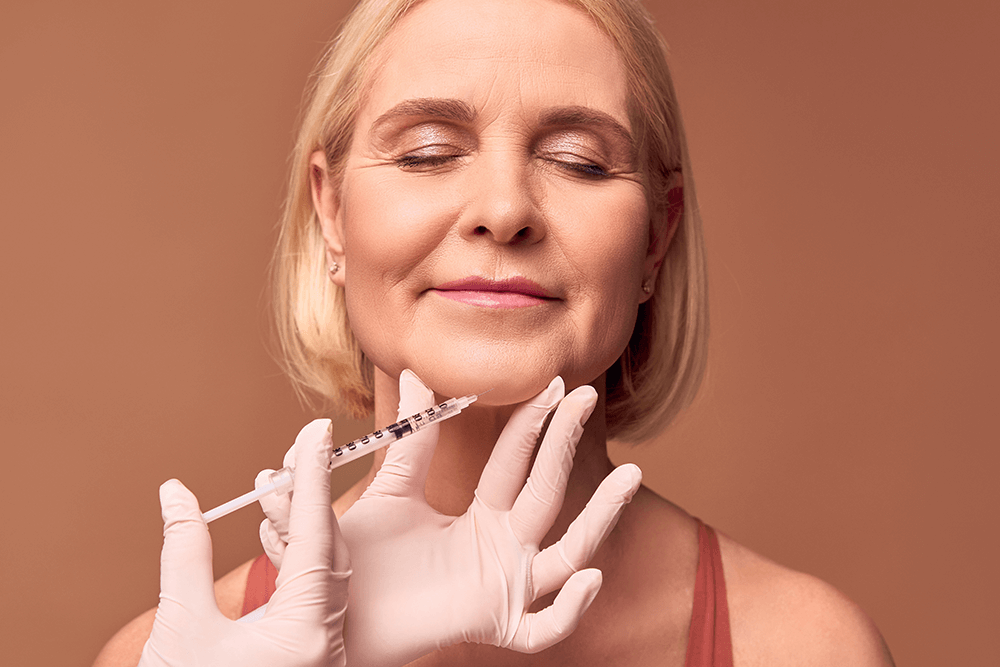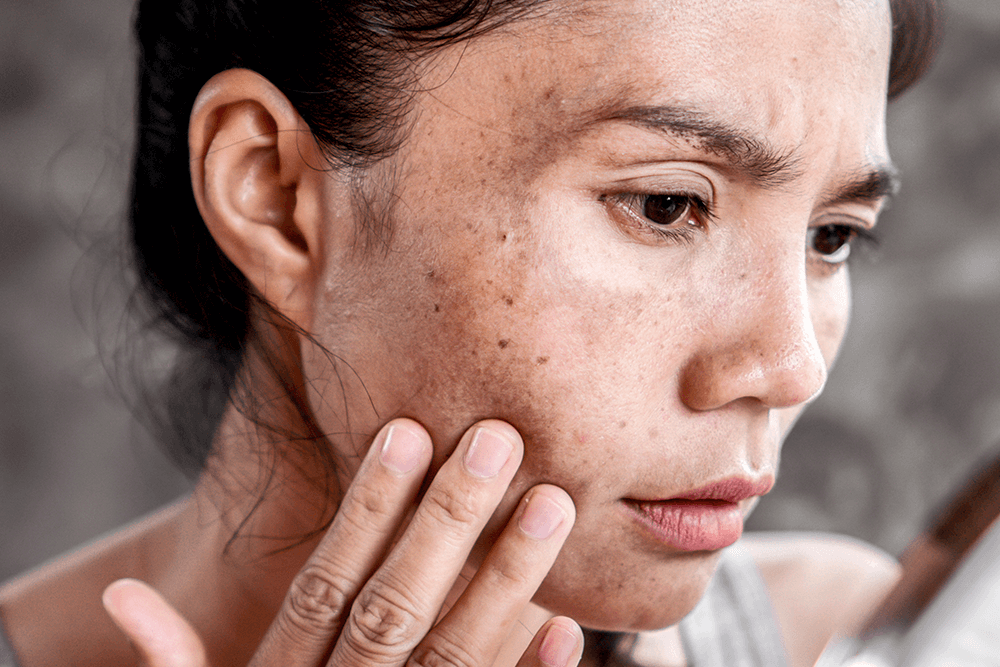For more skincare tips from the experts at Dr. Dennis Gross, check out our blog’s newest content today. Shop the collection of Dr. Dennis Gross bestselling skincare backed by dermatologists.
The+Source
Scientists hate to give absolutes about anything. After all, there are always exceptions to any situation, despite what research may show — like the couch potato in perfect cardiovascular health, for example. But you don’t need to be a researcher to notice that you often look and feel better (overall, not just your skin) when you’re following a nutritious diet full of fruits, vegetables, and other whole foods, as opposed to washing down bon bons with martinis.
For many people, this difference becomes wildly apparent when they get themselves “back on track” in January after the holiday season. And since skin health is just one component of a person’s overall health, it stands to reason that your skin will look better when your entire body is in peak form.
So what’s a “healthy diet” anyway?
The basics haven’t changed from what you learned in school and what the USDA and US Department of Health and Human Services have been banging on about for years: Lean into an array of vegetables and fruits, whole grains, protein, dairy (yes, dairy is OK for most skin types), and oils; try to minimize added sugar, saturated fat, sodium, and booze.
However, some small-scale studies lend credence to the notion that certain foods can do more than simply keep your heart healthy and your cholesterol low. They can also have a measurable and specific impact on your skin.
Fruit intake up, wrinkle formation down
One Dutch study, published in the Journal of the American Academy of Dermatology, found that women whose daily diet included lots of fruit had less facial wrinkling by the time they reached 60 or 70 than women who consumed more red meat and snack-dominated diet throughout the years. (It made no difference for men either way. Go figure.)
No joke: The Mediterranean diet may lessen skin cancer development
Another study, one published in the American Journal of Clinical Nutrition, found that French women who followed a Mediterranean diet (think whole grains, fruits, vegetables, nuts, olive oil, and fish high in omega-3 fatty acids, such as salmon) had a lesser risk of developing skin cancer (specifically melanoma and basal cell carcinoma) than women who did not.
While the authors of the Dutch study didn’t infer causation, the researchers of the French study theorized that the Mediterranean diet’s established antioxidant and anti-inflammatory properties (and reports of its ability to reduce cancer risk, in general) could be responsible for its positive influence on the development of skin cancer.
Dietary cornerstones of healthy skin
You are what you eat, as they say, and the first thing to note about eating for healthy skin is the word “eating.” It’s infinitely better to get these nutrients through actual food than by popping a pill. (Some studies have even shown that taking the supplement form of a specific nutrient can have the opposite — negative — effect of ingesting the same nutrient in something like a piece of fruit, for example.) When it comes to your health, there are no shortcuts.
Water
Recommendations vary on the amount of water a person needs to drink every day, but all researchers agree that you need to drink at least some water daily. That helps keep your body hydrated, which is critical for all your organs (skin included) to function properly and efficiently. No, drinking water won’t replace a topical moisturizer, but if you don’t regularly hydrate yourself internally, you’ll eventually notice the dryness impacts on your skin.
Fruits and vegetables
Fruits and veg contain a plethora of antioxidants. You probably think of oranges and vitamin C, but the citrus fruit contains many other antioxidants beyond vitamin C. (And oranges aren’t even the fruit that contains the highest amount of vitamin C. That prize goes to the Kakadu plum.) Vegetables are also packed with antioxidants, of course, plus other goodies like potassium and folate. Consuming a variety of both ensures you get the widest range of antioxidants and other essential nutrients in your diet.
Fiber
If there’s one nutrient that helps keep your insides running smoothly, it’s probably fiber. Beans, dark-colored vegetables, whole grains, and many fruits are high in fiber, which will not only keep you regular, it will also help your body more easily absorb essential nutrients and antioxidants (like vitamin C) from the foods you consume.
Protein
Protein is full of amino acids. Amino acids are the starting point for collagen creation in your skin. They also help your body repair itself and make necessary hormones and enzymes. Your protein doesn’t have to come from meat. Plant-based protein can provide the same benefits as the cow kind.
Oils
Oil can seem like a dirty word when it comes to skin. After all, oil in your skincare products can sometimes lead to breakouts. But oil in your diet is always a good idea. For one thing, some vitamins, like antioxidant vitamins A and E, are fat soluble, which means your body can’t absorb them unless there’s also fat in your diet. You already know antioxidants are essential inside and out, so you don’t want to let any go to waste. However, you need to be wise in your oil section. Experts advise staying away from seed oils and consuming vegetable oils, like olive, or foods such as fish and nuts.
The one supplement that’s good for skin health: skincare
While you’re working on improving your skin from the inside out, you can help speed the process by combining proven ingredients in your diet with proven ingredients in your skincare. Especially, the tried-and-true, endlessly researched, dermatologist-favorite quartet of vitamin C, retinol, hyaluronic acid, and peptides.
Vitamin C
No other antioxidant gives you the same bang for your buck that you get from vitamin C. This single ingredient can do everything from fighting off free radicals and helping build collagen to decrease the appearance of discoloration and reduce sebum production.
Find it in: Our Vitamin C Lactic collection
Retinol
One thing nearly all dermatologists have in common? They use retinol as part of their at-home skincare routines. The vitamin A derivative has been studied since the 1970s, and no other ingredient has retinol’s track record for creating a complete skin makeover — reducing the look of lines and wrinkles, evening skin tone and texture, and minimizing breakouts.
Find it in: Our Advanced Retinol + Ferulic collection
Hyaluronic acid
Dry skin doesn’t stand a chance against this ultra-hydrating molecule. Able to absorb a banana's amount of moisture from the surrounding air (up to 1,000 times its weight in water), hyaluronic acid is the ingredient everyone can agree on. It plumps, and hydrates, and it keeps skin soft and smooth.
Find it in: Our Hyaluronic Marine collection
Peptides
Want to stimulate your body to make more collagen? Yes, please! Peptides are the middleman that gently encourages the skin to ramp up its collagen factory. As a result, peptides can help lead to plumper, firmer skin.
Find it in: Our DermInfusions collection








